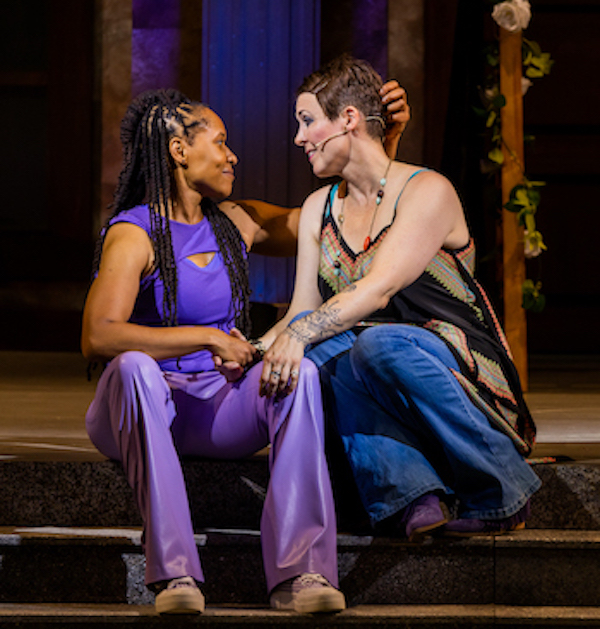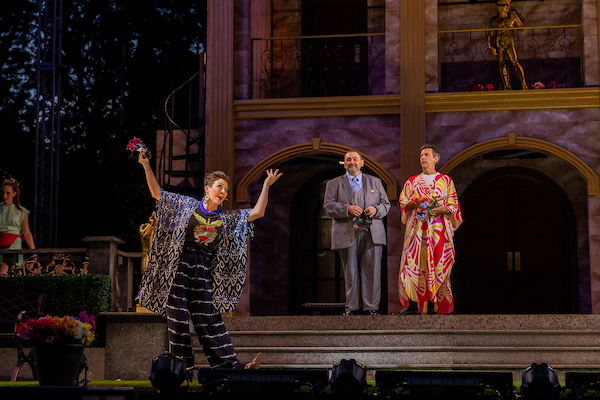Theater Review: Commonwealth Shakespeare Company’s “Much Ado” — “A Giddy Thing”
By Bill Marx
Shakespeare’s text has been streamlined for easy consumption on a summer’s evening — there’s no intermission, lots of physical comedy, and a party vibe.
Much Ado About Nothing by William Shakespeare. Directed by Megan Sandberg-Zakian. Presented by Commonwealth Shakespeare Company on the Boston Common, through August 7.

Tia James and Rachael Warren in CSC’s Much Ado About Nothing. Photo: Nile Scott Studios
CSC director Megan Sandberg-Zakian’s decision to set this Much Ado About Nothing in the ’90s makes theatrical and political sense, and not only because its Operation Desert Storm soldiers are returning to an American pop culture filled with “bright colors and big hair” as well as “a potent undercurrent of hip-hop, grunge, and queer theory.” Of course, the choice offers opportunities aplenty for zesty (and nostalgic) costuming, dancing, and music, and the likeable production makes amusing use of them. The text has been streamlined for easy consumption on a summer’s evening — there’s no intermission, lots of physical comedy, and a party vibe.
More interesting are the ironic intimations about how things were going to go down in 2003 with the disastrous invasion of Iraq. The words slander and deception pop up often in Much Ado. Deception may be used to bring reluctant love birds Beatrice and Benedick together, but the enthusiasm for perfidy is also symptomatic of a society (and military?) that revels in the power plays of masquerade, a male-dominated world that — when its superficiality is disturbed — becomes very nasty very quickly. There is something vacuous about Messina: alongside (for me) Shakespeare’s most human romancers, most of the other characters are one-note, as if the Bard is a bit bored with them. Even the villain, Don John, is sort of generic — mean just for the sake of being mean. Still, like the far more mysterious Iago, he has his victims’ numbers. He knows how gullible (or empty) they are.
So, in an age chockablock with social media slander and deception, where reputations are destroyed by a tweet, the time-bend premise showed promise. The couplings in Shakespeare’s comedies are often tinctured dark. Claudio and Don Pedro call off Hero’s wedding on the flimsiest of evidence — there’s no investigation, just humiliating denunciation in public. That Hero has no problem with going through with the marriage to Claudio (once things are cleared up) says something about the debased position of women as well as the prerogatives of “manhood.” But Sandberg-Zakian doesn’t seem interested in exploring that provocative aspect of her update. She bites into the debacle and its aftermath, but the show’s lite comic tone is slathered on too thick. I liked Remo Airaldi’s self-pitying nasal snarl when, as (loving?) father Leonato, he wishes his disgraced daughter was dead. But it is telling that, when Beatrice asks Benedick to kill Claudio to avenge her cousin’s unfair disgrace, many in the Boston Common audience laughed, at least on the night I attended. The request should be chilling because it reflects her steely fury, a touch of feminist payback.

Rachael Warren, Remo Airaldi, and John Kuntz in the CSC production of Much Ado About Nothing. Photo: Nile Scott Studios
Instead of delving into these undercurrents, the staging embraces the breezy early on and sticks to it, the evening’s broad brush performances inspired by the antic spirit of Kathleen Doyle’s vibrant costumes and the period’s cultural trademarks, such as hip-hop and rap. The production’s most unconventional aspect is that Benedick is a woman. The inventive give-and-take, the acrobatic bickering-and-backering of the combustible (now lesbian) pair is as wonderful as ever — the subplot, as usual, overwhelms the main attraction. As Beatrice, Rachael Warren initially comes on too strong, assuming (falsely) that she has to help propel the wallop of the character’s sarcasm. Warren becomes more effective later on, the actor’s humanity cutting against her earlier urge to hammer insults home. Tia James’s Benedick neatly combines strength with vulnerability. This is an interestingly multidimensional portrait propelled, in part, by the refreshing spin she puts on some of Benedick’s lines — welcome doses of off-speed attitude. The vocal delivery of the other cast members is clear, if at times a bit mechanical. There is a tendency to jump down — with both tonsils — on key words.
The other performances are pretty much located on the broad musical comedy end of the spectrum. As Antonio, Leonato’s “brother,” John Kuntz is a technicolor clothes horse. He and Airaldi’s Leonato seem to be auditioning for a road show production of La Cage Aux Folles. Many of the Bard’s clowns have not aged well and, for me, Dogberry is among the moldiest, a one-or-two trick malapropist. Thankfully, the fumbling of the constable has been effectively cut back here. Debra Wise generates laughs as the bumbling leader of a crew of wind-up-toy boy scouts, but it is a sure sign of defeat when Dogberry and her fellow officers are asked to pull out kazoos. Gunnar Manchester’s Don John comes off as a male model scorned; Sarah Corey supplies engaging bluster as the lead henchperson, Borachio. Michael Underhill’s Don Pedro is smugly cynical.
As Hero and Claudio, Rebecca-Anne Whittaker and Erik Robles are enthusiastic, and that is pretty much where this Much Ado wants to be. Those high spirits might be part of the play’s appeal for these anxious times. Lenox’s Shakespeare & Company is also currently staging a production of the comedy. Man is a giddy thing, opines Benedick at the conclusion of Much Ado. Directors appear to be interpreting the word to mean elation rather than inconstancy. I am not sure life is going to be lighthearted for Hero, who is going to have to watch her step in macho Messina. But that doesn’t seem to matter — our preference, like the play’s characters, is to face the music and dance.
Bill Marx is the editor-in-chief of the Arts Fuse. For four decades, he has written about arts and culture for print, broadcast, and online. He has regularly reviewed theater for National Public Radio Station WBUR and the Boston Globe. He created and edited WBUR Online Arts, a cultural webzine that in 2004 won an Online Journalism Award for Specialty Journalism. In 2007 he created the Arts Fuse, an online magazine dedicated to covering arts and culture in Boston and throughout New England.
Tagged: Bill-Marx, Commonweath Shakesepeare Company, Megan Sandberg-Zakian

A note about the “lead sponsor” of this year’s CSC production, Amazon. It is announced at the show that the mega-corporation is interested in funding projects that “democratize the arts.” That is admirable, but perhaps the fiercely anti-union company should do more to democratize its own workplace. Just today it was reported via a leaked internal memo that the company plans to fund ambitious anti-union strategies.
The company has faced heightened scrutiny and worker activism in recent years amid reports of harsh working conditions and higher-than-average injury rates, resulting in a series of unionization attempts from Bessemer, Alabama, to Staten Island, New York. There have also been reports that Amazon has resorted to illegal efforts to curtail efforts to unionize its warehouses.
Does anyone have any doubt that much more money is going into anti-union efforts than is being spent to support the arts, which is about cleaning up its mucky brand?
Commonwealth Shakespeare Company’s interpretation of Much Ado About Nothing was very odd and confusing. They used the original words sometimes and changed the words on others.This resulted in people being referred to as a man in one scene and a woman in another. This lack of consistency made it difficult to follow who was being talked about.